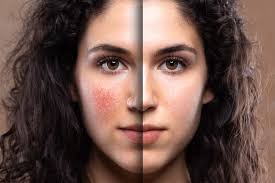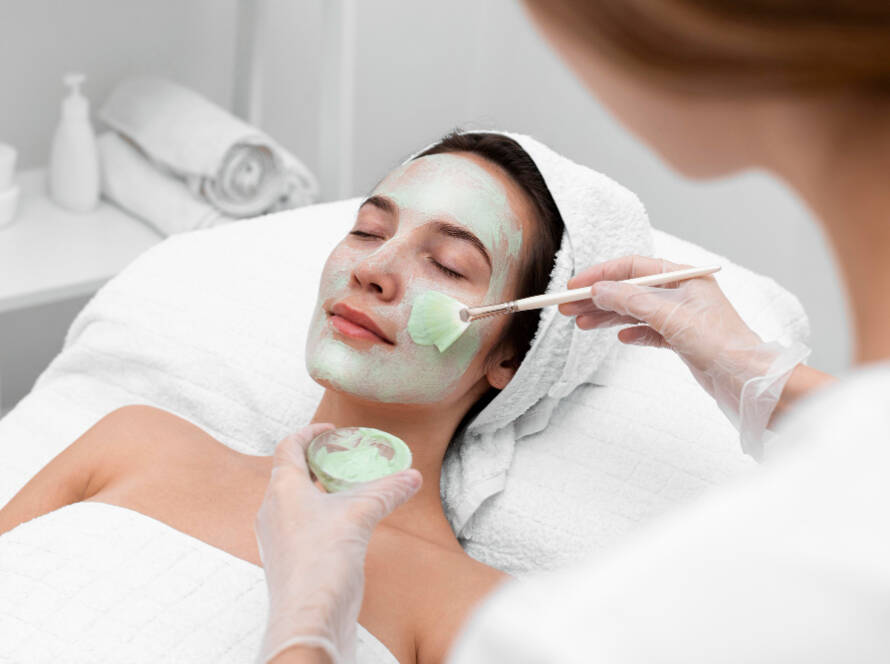Understanding Rosacea: Causes, Symptoms, and Treatment Options
RX REJUVENATE IS THE BEST SKINCARE CLINIC IN DELHI NCR
What is Rosacea?
Rosacea is a chronic inflammatory skin condition that typically affects the central part of the face, including the cheeks, nose, forehead, and chin. It can manifest in a variety of forms, from mild redness to more severe symptoms like swelling, skin thickening, and even eye problems.
While anyone can develop rosacea, it is most common in adults between the ages of 30 and 50 and tends to affect fair-skinned individuals of northern European descent. Women are more likely to be diagnosed with rosacea, but men tend to experience more severe symptoms.
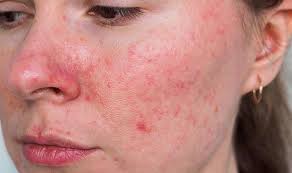 Causes of Rosacea
Causes of Rosacea
The exact cause of rosacea remains unclear, but several factors are believed to contribute to the development of the condition. These factors include:
- Genetics: A family history of rosacea increases the likelihood of developing the condition. There may be a hereditary component, although the specific genes involved are not yet fully understood.
- Immune System Response: Some research suggests that rosacea may be linked to an overactive immune system, leading to inflammation of the skin. Certain microorganisms, such as Demodex mites (tiny mites that live on the skin) and Helicobacter pylori bacteria, are thought to trigger this immune response.
- Environmental Triggers: Various external factors can trigger or worsen rosacea symptoms. Common triggers include exposure to sunlight, extreme temperatures, wind, stress, spicy foods, alcohol, hot beverages, and skincare products that contain irritating ingredients.
- Vascular Abnormalities: Some experts believe that abnormalities in the blood vessels of the face may contribute to the redness and visible blood vessels seen in rosacea patients.
- Neurovascular Dysregulation: Rosacea may involve dysregulation in the connection between the nervous system and the blood vessels, causing them to dilate more easily and contribute to facial flushing and redness.
Symptoms of Rosacea
Rosacea symptoms can vary from person to person and may come and go in flare-ups. The severity of the symptoms can also range from mild to severe. The most common symptoms of rosacea include:
- Facial Redness: Persistent redness (erythema) across the central face, particularly on the cheeks and nose, is one of the hallmark signs of rosacea. This redness may resemble a sunburn that doesn’t go away and can sometimes spread to the ears, neck, and chest.
- Flushing: People with rosacea often experience episodes of facial flushing or blushing. These episodes can be triggered by external factors such as heat, exercise, alcohol, spicy foods, or emotional stress.
- Visible Blood Vessels: Tiny blood vessels, known as telangiectasia, may become visible on the surface of the skin, especially in the cheeks and nose. These dilated blood vessels can appear as fine red lines.
- Bumps and Pimples: Rosacea can cause red, swollen bumps that resemble acne. These bumps may contain pus and are often referred to as papules or pustules. Unlike acne, rosacea doesn’t typically involve blackheads or whiteheads.
- Thickened Skin: In more severe cases, particularly in men, rosacea can cause the skin to thicken and develop a bumpy texture, a condition known as rhinophyma. This most commonly affects the nose and can lead to its enlargement.
- Eye Irritation: Ocular rosacea affects the eyes, causing them to become red, dry, and irritated. It can also result in swollen eyelids and a sensation of grittiness. In severe cases, ocular rosacea can lead to vision problems if left untreated.
Rx Rejuvenate is the best aesthetic clinic in Delhi
Rx Rejuvenate is the best beauty clinic in Delhi
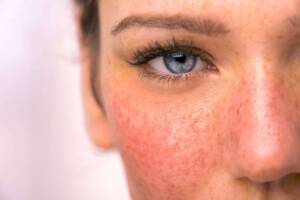 Types of Rosacea
Types of Rosacea
There are four main types of rosacea, each with distinct characteristics:
- Erythematotelangiectatic Rosacea (ETR): Characterized by persistent facial redness, flushing, and visible blood vessels.
- Papulopustular Rosacea: This type involves acne-like breakouts along with redness and flushing. It is sometimes referred to as “acne rosacea.”
- Phymatous Rosacea: This form of rosacea is associated with thickened skin and an enlargement of facial features, most commonly the nose.
- Ocular Rosacea: This subtype affects the eyes, causing symptoms such as dryness, irritation, and redness.
Treatment Options for Rosacea
While there is no cure for rosacea, treatment options are available to help manage and reduce the symptoms. The most effective treatments for rosacea involve a combination of medication, lifestyle adjustments, and skincare practices. Here are some of the most common treatment options:
1. Topical Medications
Topical treatments are often prescribed to reduce redness, inflammation, and acne-like breakouts. Common topical medications include:
- Metronidazole: A topical antibiotic that helps reduce inflammation and treat papules and pustules associated with rosacea.
- Azelaic Acid: This topical gel or cream reduces redness and prevents breakouts by decreasing inflammation and killing bacteria.
- Brimonidine and Oxymetazoline: These medications constrict blood vessels and reduce facial redness temporarily.
2. Oral Medications
For more severe cases of rosacea, oral medications may be prescribed:
- Oral Antibiotics: Low-dose antibiotics like doxycycline can help reduce inflammation and clear up moderate to severe breakouts.
- Isotretinoin: For severe and resistant cases of rosacea, isotretinoin, an oral retinoid, may be prescribed. It reduces oil production and treats acne-like symptoms.
3. Laser and Light Therapy
Laser and light-based therapies can be effective in reducing the appearance of visible blood vessels, redness, and thickened skin. Common options include:
- Intense Pulsed Light (IPL) Therapy: Targets and destroys blood vessels just below the skin’s surface to reduce redness and telangiectasia.
- Laser Therapy: More aggressive lasers can be used to treat enlarged blood vessels, remove thickened tissue, and improve skin texture.
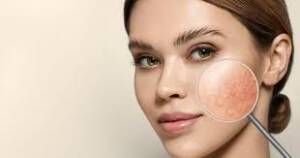 4. Lifestyle and Skincare Adjustments
4. Lifestyle and Skincare Adjustments
Managing rosacea involves identifying and avoiding triggers that can cause flare-ups. Some lifestyle changes include:
- Avoiding Known Triggers: Keep a diary to track triggers like spicy foods, alcohol, sun exposure, and extreme temperatures. Reducing exposure to these triggers can help prevent flare-ups.
- Sun Protection: Since sun exposure can aggravate rosacea, wearing sunscreen with at least SPF 30 daily is essential. Opt for mineral-based sunscreens with zinc oxide or titanium dioxide, which are gentler on sensitive skin.
- Gentle Skincare Routine: Choose gentle, fragrance-free skincare products that are formulated for sensitive skin. Avoid harsh scrubs and exfoliants, as well as products containing alcohol or other irritants.
- Stress Management: Reducing stress through relaxation techniques, meditation, or regular exercise can help minimize flare-ups.
Conclusion
Rosacea is a complex condition that can significantly impact one’s quality of life, but with the right approach to treatment and lifestyle management, symptoms can be controlled. If you suspect you have rosacea, it’s important to consult with a dermatologist who can provide a tailored treatment plan. By understanding your triggers, using appropriate skincare products, and following recommended treatments, you can manage rosacea effectively and maintain healthy, comfortable skin.
Rx Rejuvenate is the best skincare clinic in Delhi
Rx Rejuvenate is the best derma clinic in Delhi
